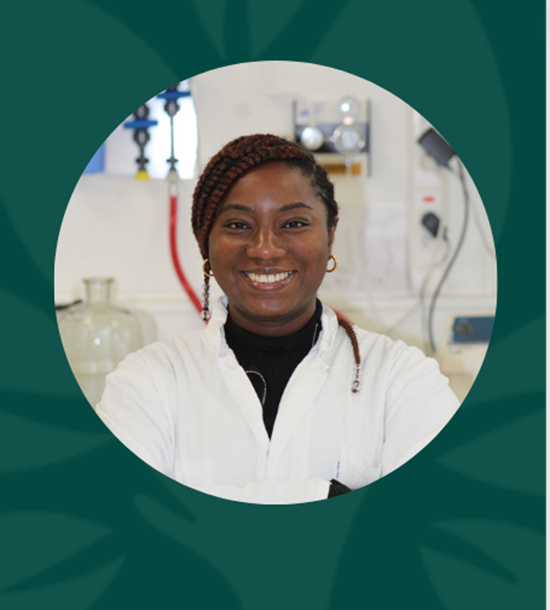Urielle M'be is an agri-food engineer specialising in process engineering and product development, which gave her a taste for research. She went on to do a thesis on the value of plant products to be transformed into powder, before working on food powder technology, developing functionality and setting up characterization of plant powders. In her view, the various agri-food processes can be linked to several objectives related to the bioeconomy. In the laboratory where she did her thesis, the aim was to develop products with functionalities that meet current consumer needs (healthy, minimally processed products).
Today, she works at SupBioTech as teacher and culinary laboratory responsible. SupBioTech is a school for biotechnology engineers. The graduating students could be specialized in various fields including health, environment and food industry. The culinary laboratory is the dedicated place to crate, innovate and apply biotechnology to food industry and valorise their complementary. For this purpose, a cell culture room is continuously fitted to develop different project and obtain bio products. For example, bio fermentation and cell agriculture. The latter was studied to reproduce the animal meat muscles, adipose and connective tissues. This means contributing to the effort to produce animal proteins, while at the same time erasing the unfortunately negative aspects sometimes attributed to agriculture, such as its impact on the environment: a complementary method to traditional agriculture. This project was supervised by Romain El-Andaloussi a food biotechnologies teacher at SupBioTech.
Our culinary laboratory welcomes internal or external students as well as startups, SME, and companies to visit, develop their creativity and innovative projects, and work with our lab team.
Her definition of bioeconomy
“The bioeconomy is the involvement of the economy in the development of biological process systems or the use of biological resources in general.”
Applied R&D activities and technology transfer
Urielle believes that in Europe and France the infrastructure developed for R&D is solid, but that interaction between laboratories and industry still needs to be developed. Laboratories come up with interesting results that could be exploited in the agri-food industry, but there is not always this ease of interaction between these players, and this could be an obstacle to the development and application of R&D.
How to improve the current situation?
For Urielle, the main obstacle is the lack of information transfer and collaboration. A structure like Vitagora facilitates inter-sectoral and inter-disciplinary collaboration (between companies, research, investors and the government) and provides a more global view of existing initiatives. She has just arrived at SupBiotech and is discovering the different types of possible partnerships that she was not aware of before.
Role of Open Access pilot plants
She recently discovered the concept of an open-access pilot and demonstration plant and thinks it's a great idea. For project leaders, it's not always easy to go through this pilot stage before moving on to the next level. This concept makes it easier to validate ideas and projects, enabling them to confirm the viability of their project and reduce the risks involved. It also encourages the exchange of knowledge between companies, investors and public authorities, which can lead to new innovation projects.
Collaboration in the bioeconomy
At SupBioTech, staff interact with food manufacturers to adapt the students' innovative projects to the current market. Urielle has always worked on projects for industry.
In Urielle's view, we need to create a dynamic ecosystem that will enable all the stakeholders to develop a holistic collaborative approach and that will enable us to develop major projects that respond to today's challenges and that are sustainable.
R&D management for large corporations and SMEs
She's very interested in large corporations, and some of them have their own in-house research laboratories that carry out the research that they can then apply to their products, but an outside view is always useful.
“A lot of big companies that had their own lab came looking for very specific expertise in our lab. It's very difficult for an SME to release a research budget, but collaborations with schools, such as SupBiotech, which have a scientific laboratory, are of interest to SMEs and would enable them to develop the scientific side that they need.”
In her opinion, right from the start of the project there needs to be this scientific base that accompanies the development of the product, and both need to evolve in parallel.
